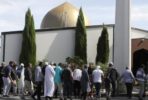Malaysian Minister Khairy Jamaluddin urged religious departments on Sunday (May 28) to help the poor instead of nabbing Muslims who skip fasting during Ramadan, a punishable offence under Shariah law.
“Instead of religious departments spending money on enforcement people looking for people ponteng puasa (skipping the fast), use them to help ‘asnaf’ and to do good,” the Malaysian youth and sports minister tweeted.
Instead of religious depts spending money on enforcement ppl looking for people ponteng puasa, use them to help asnaf and to do good.
— Khairy Jamaluddin (@Khairykj) May 28, 2017
The word “asnaf” refers to those who are eligible to receive zakat (alms) collections, including the poor.
“In terms of priority, it is more important we help the needy than enforce personal religious obligations. There is no compulsion,” he added.
Another observation (more controversial): resources used to catch people not fasting should be used to help the poor and needy instead.
— Khairy Jamaluddin (@Khairykj) May 28, 2017
Mr Khairy, however, admitted that it was “difficult”, when a Twitter user suggested that he put his proposal in a manifesto and to expand it to the entire concept of moral policing.
“This is difficult. I will be honest with you. Years of bureaucratisation of religion has created a behemoth. Almost sacrosanct,” Mr Khairy replied @zurairi.
Under the Federal Territories’ Shariah Criminal Offences Act 1997, Muslims face a fine of not more than RM1,000 (S$323) or maximum six months’ jail, or both, if they are caught openly eating, drinking or smoking during Ramadan. Similar provisions exist in Shariah law in other states.
The Terengganu religious affairs department recently said it would take action against Muslims who do not fast and Muslim-operated eateries or stalls that start operating before 3pm. The 3pm operating rule is reportedly imposed on fast food chains and Ramadan bazaars as well, except for eateries operated by non-Muslims.
Mr Khairy also questioned why there were so many public “buka puasa (breaking fast)” functions when Ramadan should be a time for quiet reflection.
The youth and sports minister, who is also Umno Youth chief, highlighted that politicians’ schedules were packed with breaking of fast events during the Muslim fasting month, lamenting that there was “no time to reflect”.
“It becomes a month of political obligation more than religious reflection. More concerned that we attend functions than appreciate the month.
“As a politician I am aware of this obligation. And I do it. Doesn’t mean I don’t have thoughts about it and how it should be otherwise,” Mr Khairy tweeted in a series of tweets.
Source: http://www.todayonline.com







